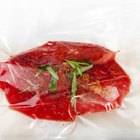
Kondor83/iStock/Getty Images
Food stored in warm conditions, even for short periods, can be a breeding ground for microorganisms. Many of these can have harmful effects on humans. The Food and Drug Administration provides guidelines for proper refrigeration temperature to limit the risk of food-borne illnesses.
Refrigerator Temperature
The FDA recommends that refrigerators be set to 40 degrees Fahrenheit or below. Check the temperature on the refrigerator's thermometer, or use an appliance thermometer to determine that the refrigerator settings are correct. Place the appliance thermometer in a glass of water in the center of the refrigerator for five to eight hours, then check the temperature. If it is above 40 degrees, adjust the refrigerator's settings.
Freezer Temperature
According to the FDA, a freezer should always be set at 0 degrees Fahrenheit or below. Test the temperature of your freezer with an appliance thermometer placed between frozen food packages. Freezing renders the microbes in food inactive. Although prolonged freezing may reduce the quality of some foodstuffs, particularly if they are not sealed in airtight containers, the food will remain safe to consume.
What to Refrigerate
The FDA recommends -- and common sense dictates -- that consumers refrigerate perishable foods such as milk, seafood, meat, poultry and eggs. Most fruits and vegetables don't need to be refrigerated for food safety, although some may last longer if refrigerated. If in doubt, follow the refrigeration instruction on a food's packaging. Although refrigerated food is safer, always check for signs of spoiling.
The Two-Hour Rule
Perishable food should never be left out of the refrigerator for more than two hours. Beyond this point, the growth of microorganisms may reach harmful levels. If the room temperature is high -- 90 degrees F or higher -- this time period is shortened to one hour. Ideally, food should be refrigerated or frozen as quickly as possible.
Related Articles

How Long Can Milk Stay Unrefrigerated?

Food Safety Tips for Frozen Pork

Rules for Thawing and Refreezing Meat

Guidelines For Refreezing

How Long Can a Bagel With Cream Cheese ...

What Are the Best Containers to Freeze ...

Does Cream Cheese Filling Have to Stay ...

How Long Can Meat Stay out of the ...

Why Does Milk Freeze in the ...

Can I Cook a Chicken Five Days After ...

Does Brandy Freeze?
Can You Use Stew Meat That Has Been ...

Can You Freeze Casseroles With ...

How Long Can Raw Meat Sit Out?

Can You Cook Frozen Foods That Are Past ...

The Safety of Refrigerators and ...

Does Canned Soup Go Bad?

How to Keep Lunch Meat

How Long Can Cupcakes Be Stored After ...

How to Store Smoothies in the Fridge
References
Writer Bio
Dr James Holloway has been writing about games, geek culture and whisky since 1995. A former editor of "Archaeological Review from Cambridge," he has also written for Fortean Times, Fantasy Flight Games and The Unspeakable Oath. A graduate of Cambridge University, Holloway runs the blog Gonzo History Gaming.
Photo Credits
Kondor83/iStock/Getty Images